Let’s get this straight… there is no such thing as a B2B Google algorithm. However, things run quite differently when you are targeting businesses and not consumers with your SEO efforts.
B2B keyword research works best with precise targeting, low search volumes, and a healthy dose of creativity.
In this article, you will learn how to perform B2B keyword research by using B2B modifiers, uncovering potential in Search Console and internal search, and most importantly, leveraging insights from sales and customer success.
The Challenges Of B2B Keyword Research
Keyword research for B2B can be tricky. A few common challenges include:
Targeting The Right Audience
You need to know the decision-makers in the company vs. the people actually using your product or service.
The executives might have different needs and questions than the marketing manager using the software after it is purchased.
You need to be clear on the different target audiences and their search behaviors since each has unique needs.
The more senior your target audience, the more important your expertise in their area.
Here are a few questions to inspire your research:
- What type of business are you targeting? What team size? Country? Industries?
- What type of role are you targeting within these businesses? Executives or implementors?
- What are the challenges of the decision-makers? What are they trying to achieve?
- Who are the main competitors?
Low Search Volume
Here is an example: the B2C keyword “to-do list app” has 5,400 monthly searches according to Ahrefs.
The very targeted B2B keyword “enterprise project management software” has 250 monthly searches. And some B2B keywords will have as little as 10 to 50 searches per month.
For B2B SEO, we have to rethink our goals related to search volume and traffic potential. Specific keywords usually bring more qualified leads and revenue – but look scary in the keyword research document.
Small Keyword Databases
Have you ever typed targeted, long-tail keywords into your SEO tool and received zero results? Well, this will happen in B2B if you really understand your target audience and their needs.
Most SEO tools do not have the right keyword database for these niche topics and will simply present no results even though people are searching for them.
In B2B, you will almost always want to combine the results from several SEO tools like Ahrefs, SEMrush, Search Console, and Google Keyword Planner to get a better understanding of the keyword universe.
The Art Of Using B2B Keyword Modifiers
The trick to finding good and targeted keywords for B2B is to use modifiers that are not typically used in a B2C context. You can experiment with the following modifiers:
- Corporate or enterprise, e.g. enterprise project management software.
- SME or small business, e.g. performance management software for small companies.
- Startup, e.g. startup work culture.
- Online business, e.g. online business accounting software.
- RFP, e.g. construction RFP.
- Procurement, vendors, providers e.g. procurement project management.
- Product modifiers such as software, tools, solutions, systems, platforms, e.g. project management solutions (often “app” hints at B2C intent).
- Competitor name + alternative, e.g. Microsoft Teams alternative.
- Competitor name + vs/versus, e.g. Asana vs Monday.
- Reviews, e.g. Asana project management reviews.
- How to choose/buying guides, e.g. how to choose CRM.
- For business, e.g. Whatsapp for business.
- In the workplace, e.g. diversity in the workplace.
- Employee, e.g. how to welcome a new employee virtually.
- Your target industries, e.g. trends in retail, employee engagement ideas for restaurants.
- Your use cases, e.g. onboarding process template.
- The problems you are solving, e.g. reduce unplanned downtime.
- Trends, e.g. trends in office management.
- Statistics, e.g. travel management statistics.
- Challenges, e.g. internal communication challenges.
To use the modifiers, enter your seed keyword into an SEO tool and then use the filter function to narrow down the results:
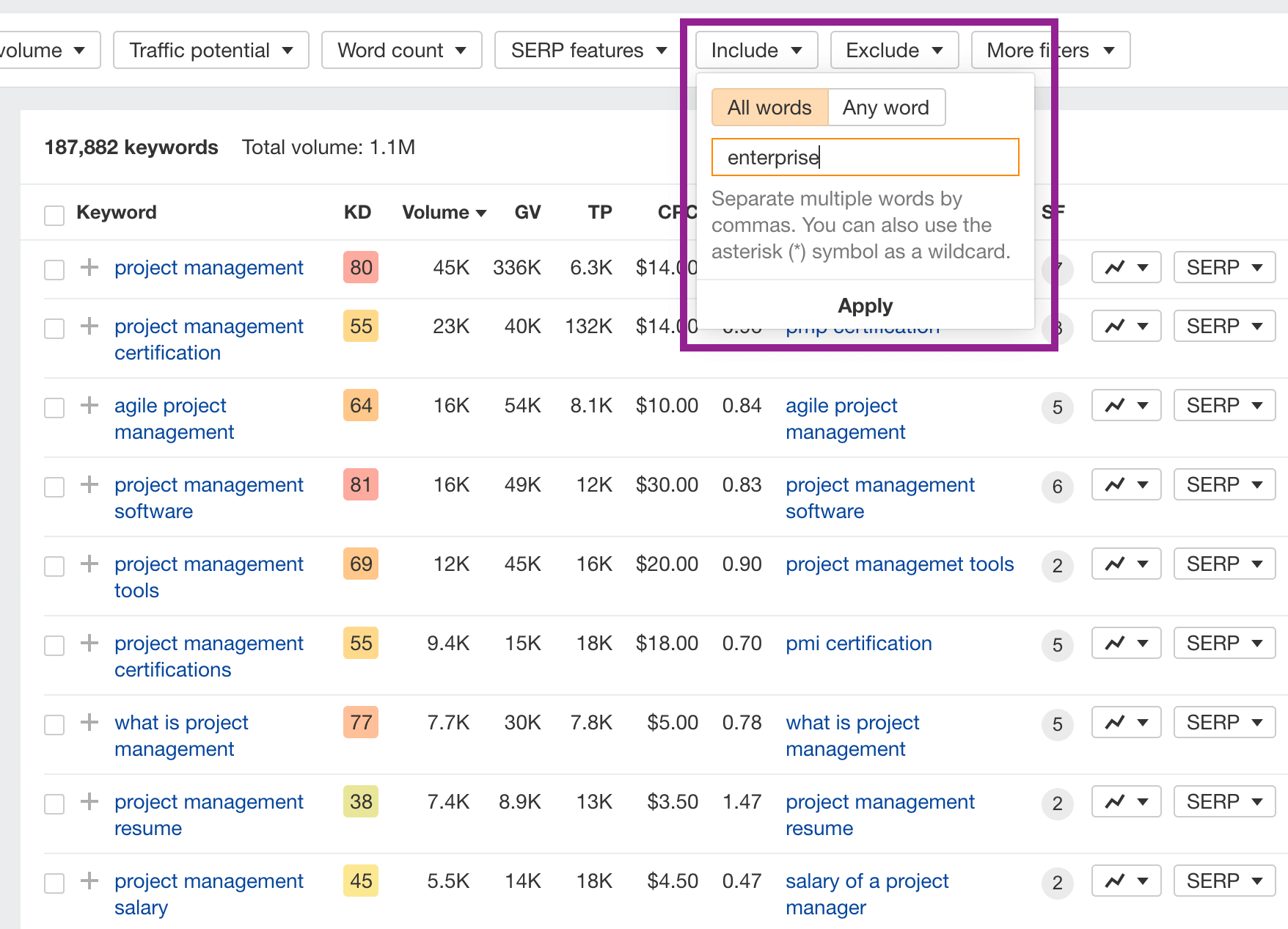 Screenshot by Author, November 2021
Screenshot by Author, November 2021Then add the keyword opportunities to your list or keyword research document:
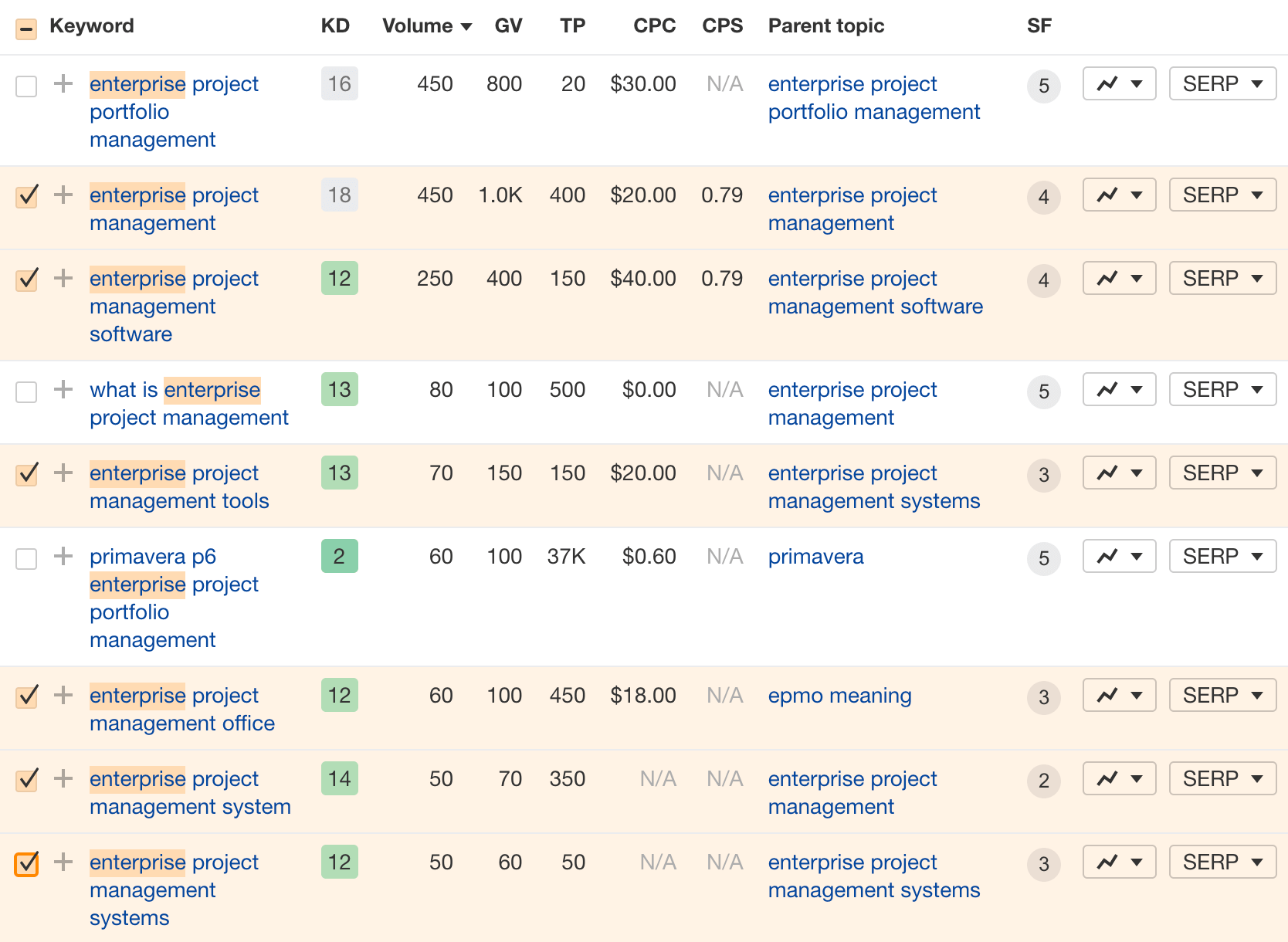 Screenshot by Author, November 2021
Screenshot by Author, November 2021Review Search Console For Hidden Opportunities
To get even more keyword ideas, be sure to review Google Search Console.
Here is an example: Ahrefs says that the keyword “trends in operations management” has 50 searches in the U.S. per month. However, one of our clients receives thousands of clicks for this keyword every single month.
In Google Search Console:
- Go to: Performance – Search Results.
- Select the timeframe (at least 3 months).
- Add CTR and average position.
- Use the filter to remove the brand name and variations from the results.
 Screenshot by Author, November 2021
Screenshot by Author, November 2021Now, review the “queries report.”
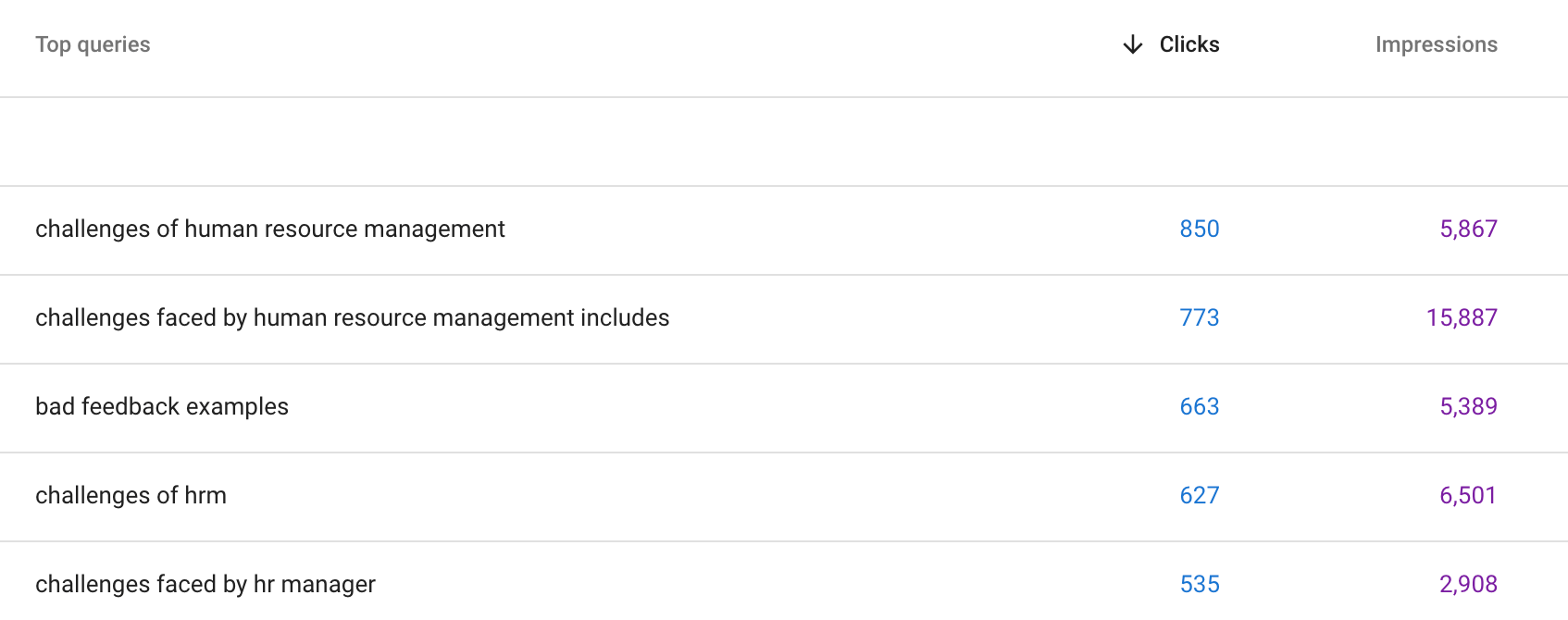 Screenshot by Author, November 2021
Screenshot by Author, November 2021Don’t Forget Your Competitors
Your competition might have some great keyword ideas. Make sure to review their keywords and backlinks in an SEO tool to learn what content is working for them.
You could try the following reports in Ahrefs:
- Top Pages.
- Best By Links.
The latter not only gives you keyword ideas but also highlights ideas for creating backlinks.
Watch out for these:
- Listicles.
- Statistics.
- Best of.
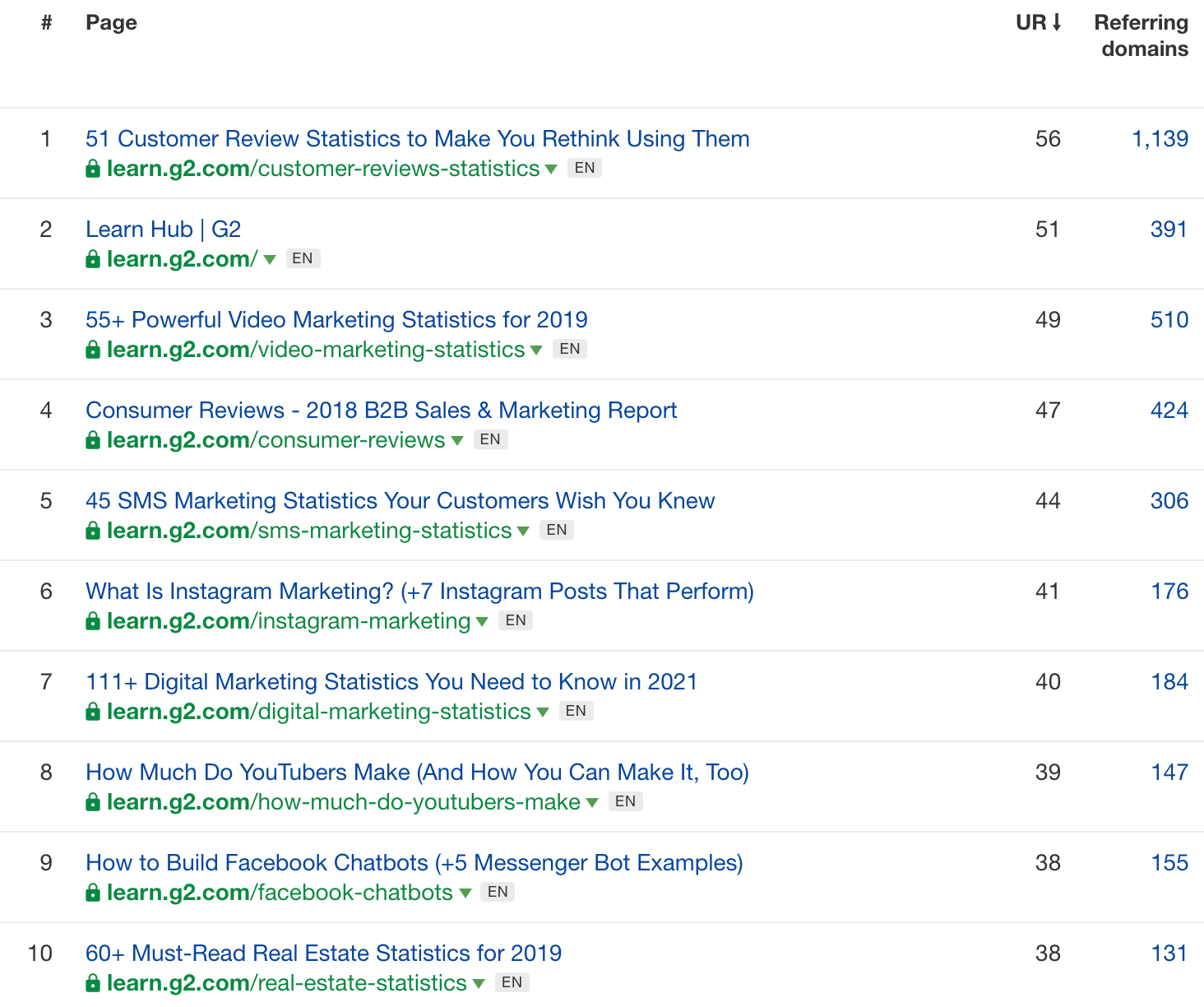 Screenshot by Author, November 2021
Screenshot by Author, November 2021Bonus: Add Your Google Ads Keywords
Make sure to add your top-converting keywords from Google Ads into your SEO research, as well. You already know that these topics and queries work for you, so make sure to include them in your organic strategy.
Bonus: Use Internal Search
If your website has an internal search function, make sure to review the most common questions for interesting queries.
Leverage The Insights Of Sales And Customer Success
Now, here is where it gets juicy. I have found some of the best keywords from reviewing sales pitches, protocols, and commonly asked questions.
Sales and customer success are at the frontline of engaging with your ideal customer. They understand their needs more deeply than any Quora or Reddit ever will.
To leverage their insights for SEO, make sure to:
- Interview sales for commonly asked questions or competitors mentioned.
- Discuss with customer success the most common use cases and what type of customers are using which one.
- Watch recordings of sales calls or read sales protocols.
- Review the tutorials or knowledge base for those articles that get the most traffic and expand on the issue outline there.
Again, some of these keywords might be very niche but when you do get these visitors to your site, your chance of making a good impression on the right people is the highest.
Selecting The Right Target Keywords
Keep in mind that keyword research is your market research and analysis. In the beginning, you will want to add all ideas to your target list, no matter the difficulty.
Once you have a good universe of potential target keywords (a few hundred to thousands), add the following data to make a final decision:
- Search volume per month.
- Keyword difficulty.
- Current ranking position and URL.
- Presence of ads in the search results and Cost-per-Click.
- Business value: On a scale of 1 (little) to 3 (high) mark the impact that this keyword will have on your business in terms of generating revenue/leads.
Now, there are two ways you can go about reviewing keyword difficulty and the right target keywords.
Pick Low Difficulty Keywords First
If you have never done SEO before and don’t have a benchmark about what kind of keywords you can target, start with low-difficulty keywords. In the SEO tool Ahrefs, this typically means a KD score of less than 10.
Make sure to review Page 1 before making a final decision. You will want to see other websites with similar domain ratings and backlink profiles in the top position to have a realistic chance of ranking.
Benchmark Your Keyword Difficulty Score
Calculate the average keyword difficulty of your top-performing keywords to understand what difficulty is appropriate for your website.
This is how you do it:
- Pull a report of your top-performing keywords: Positions 1 to 3. (Or 1 to 10, if you don’t have enough data otherwise.)
- Remove all branded keywords.
- Add the keyword difficulty score for the remaining keywords.
- Calculate the average keyword difficulty score.
- Calculate the median keyword difficulty score to cross-check.
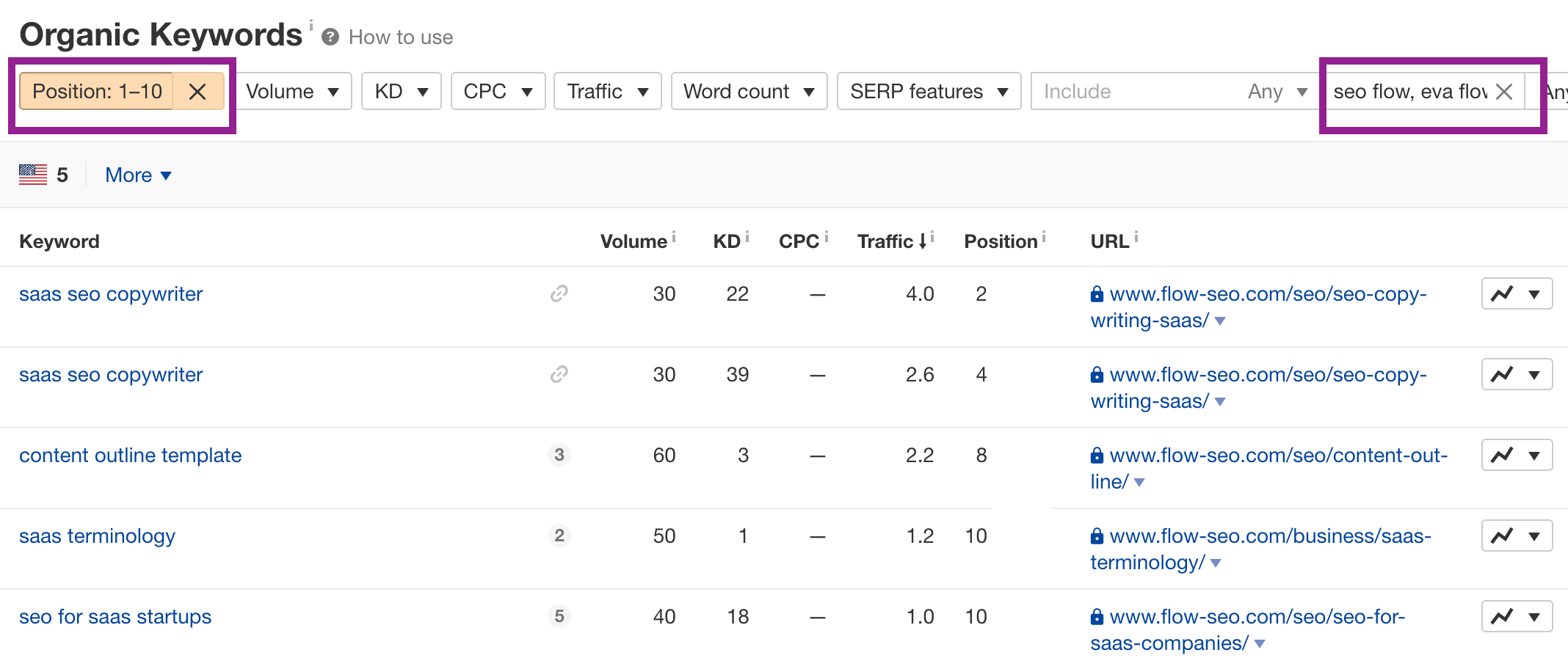 Screenshot by Author, November 2021
Screenshot by Author, November 2021This benchmark tells you that if you pick a keyword with a similar keyword difficulty score, your chances of ranking are really good because it has worked for you in the past.
If There Is No Keyword Data
If you found a keyword that does not have search volume or difficulty data in the SEO tools, you must review Page 1.
Again, you want to make sure to see the website with similar authority to yours in the top positions to gauge if you rank as well.
A Word On B2B Keyword Mapping And Content Types
Now, that you have your list of target keywords, you will want to map these against pages and articles.
The number one rule of SEO is one keyword cluster per page; one page per keyword cluster.
Make sure that your website structure is clean and easy for Google to understand by giving each set of target keywords one designated home.
Since we are in B2B, you will want to ask yourself what type of content is appropriate for the query, tactical or strategic?
- Tactical content pieces are practical how-to guides that show a process or method. They are interesting for those people using your B2B service or product. They allow the reader to implement a new process.
- Strategy content pieces teach mental models, frameworks, and strategies. They are typically consumed by executives and managers. They teach new ways of thinking and making decisions.
For each of your target keywords, you will decide if they are targeting decision-makers or implementors. Then choose the right content type (tactical/strategic) accordingly.
Conclusion
Oftentimes, we like to talk about B2C and the people you market to. Keep in mind that B2B means also marketing to people – people within businesses.
These people need you to meet their pain points and desired outcomes, communicate clearly and craft a compelling piece of content.
With these tips on keyword research for B2B, you should be able to create a content calendar that works for your ideal customers and your SEO strategy.
More Resources:
- B2B Content Ideas to Generate Links & Industry Influence
- Multi-Channel B2B Lead Generation: 8 Steps to Success
- How to Do Keyword Research for SEO: The Ultimate Guide
Featured image: Shutterstock/thodonal88





